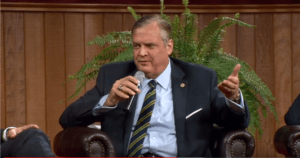A Southern Baptist Convention leader who comments daily on current events went on defense in a panel discussion about social justice and the gospel after the moderator suggested he ignores topics that hit too close to home.
During a Wednesday Q&A panel discussion at the 2019 Shepherd’s Conference, Southern Baptist Theological Seminary President Albert Mohler challenged an assertion “you have been remarkably silent” when it comes to concern about liberal “social justice” rhetoric cropping up in conservative evangelical groups such as the Gospel Coalition and Together for the Gospel.

Albert Mohler responds to follow-up questions about ‘social justice’ rhetoric cropping up in conservative evangelical groups such as Together for the Gospel. (YouTube)
Last fall John MacArthur and a dozen other Christian leaders launched a website presenting The Statement on Social Justice & the Gospel claiming the Bible’s teaching on subjects including race, gender roles and human sexuality is being challenged “under the broad and somewhat nebulous rubric of concern” commonly labeled as social justice.
The statement, now signed by more than 10,000 names, warned that “postmodern ideologies derived from intersectionality, radical feminism and critical race theory” are spreading into Christian organizations, “including some that are evangelical and Reformed.”
Mohler declined to sign the statement. So did his fellow co-sponsors of Together for the Gospel, a popular biennial preaching conference, Baptist pastor Mark Dever and Presbyterian Ligon Duncan.
Appearing on stage with MacArthur, all three were asked about the apparent rare point of disagreement in matters of public theology at the conference sponsored by Grace Community Church in Sun Valley, California, where MacArthur is pastor/teacher.
“All my public ministry began dealing with these questions,” Mohler replied to moderator Phil Johnson, executive director of MacArthur’s Christian media ministry and editor of most of his major books.
“I do take a bit of offense, not personally, but I am not going to be forced into a Twitter conversation of 140 characters about these issues,” Mohler said in a live web stream later posted on YouTube.
Mohler said he did not sign MacArthur’s statement on social justice and the gospel because he “was not particularly appreciative of being handed a statement” to endorse without an “opportunity to offer any particular consultation or suggestion.”
“It’s not pride of authorship, but I am just reluctant to sign onto anything that’s not creedal and confessional that doesn’t express exactly how I would want to say something,” he said. “Not signing should not be interpreted as a rejection of common concern. I don’t think that’s fair I think you understand that.”
Johnson, who has worked for MacArthur since 1981, pressed the issue in several questions.
“Just last year at both the Gospel Coalition and Together for the Gospel, I was hearing some rhetoric that actually I first heard from Jim Wallis and Sojourners 20-30 years ago,” Johnson said. “What I am asking you, is do you not see that the evangelical movement, even our constituency, the most conservative bend of the evangelical movement, is becoming a little more susceptible to that?”
“But Phil you’ve known me for a long time,” Mohler shot back. “You know the answer to the question is yes, but I’m not going to be forced into a situation before thousands of people in which I have to say I am going to do it your way. Sorry. I’m just not. If that’s a test of fellowship amongst us, this would be a good time to find out.”
